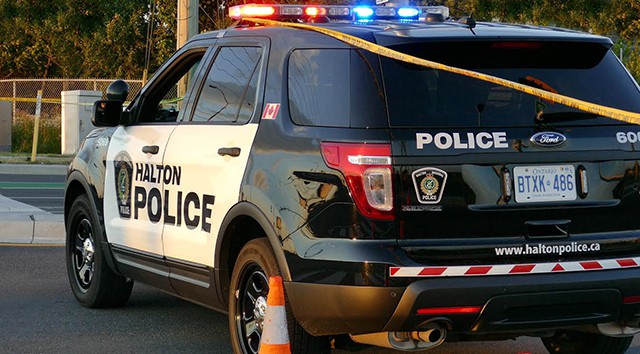Here’s How Halton Police Are Managing Mental Health Calls
Published December 1, 2017 at 3:00 am

Provincial targets for wait times are being met in Halton when it comes to police and mental health calls.
Provincial targets for wait times are being met in Halton when it comes to police and mental health calls.
Officers are working closely with hospitals to further reduce the numbers, Sgt. Dave Tutte told the Halton Police Board on Thursday.
Here’s where we stand.
Oakville-Trafalgar Memorial Hospital saw a reduction to 56 minutes from 120 minutes during the end of 2015 to the end of 2016.
Joseph Brant Hospital’s wait times were reduced to 86 minutes from 90 minutes during the same timeframe.
Ninety minutes is an ideal time by provincial standards, Tutte said, adding Halton police are aiming for 60 minutes.
Joseph Brant Hospital saw a spike due to a major renovation, he said, but the expansion created additional rooms which have reduced the wait.
Mental health calls have been on the rise across Halton over the last decade.
Police introduced a Mobile Crisis Rapid Response Team (MCRRT) on Dec. 7, 2015 “to make sure the right apprehensions are being made,” said Tutte.
“Ultimately, the goal of the program is to apprehend less people, leave people in the community” and connect them to services instead of taking them to hospital.
The program sends a police officer in an unmarked car and a registered mental healthcare professional to mental health calls.
“We know that by making an apprehension there’s an effect on police dollars, there’s an effect on the hospital dollars but the most important thing is the impact on the client,” Tutte said.
“If we can keep them in the community, as opposed to apprehending them and taking them into the hospital, it’s better for them.”
The MCRRT responded to 2,187 calls between Nov. 1, 2016 and Oct. 31, 2017 — 1,287 of which were ‘person in crisis” calls.
The team diverted 120 people in crisis from hospital during the same period; roughly 80 per cent of MCRRT’s time is spent on ‘person in crisis’ calls.
Mental health calls are evenly distributed across the region, Tutte said.
Having said that, peak times for the MCRRT are between 1 p.m. and 10 p.m. daily.
Calls don’t necessarily involve violence or weapons.
People phone 911 for many different reasons, ranging from job loss to addiction to family situations, said Tutte.
Police team up with different Local Health Integration Networks, or LHINs, to offer programs.
The MCRRT is in partnership with St. Joseph’s Healthcare Hamilton, which employs the mental health workers.
“They come to [police] headquarters and they work as part of a team,” Tutte said.
“And they go all over the region — Oakville, Milton, everywhere.”
There’s also a Crisis Outreach and Support Team (COAST) program for Halton Region residents 16 and older.
COAST provides those who are experiencing a mental health crisis with immediate outreach and support.
It’s made up of health care workers and police officers trained in mental health and crisis intervention.
COAST is supported by the Canadian Mental Health Association and is funded by Oakville-Mississauga “but they still do regional calls and follow-ups” across the region, Tutte said.
A comprehensive list of resources in Halton can be found here.
insauga's Editorial Standards and Policies advertising





